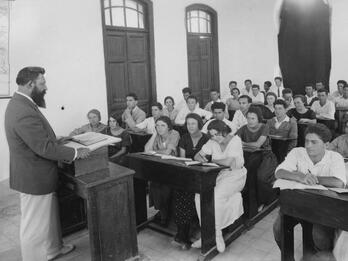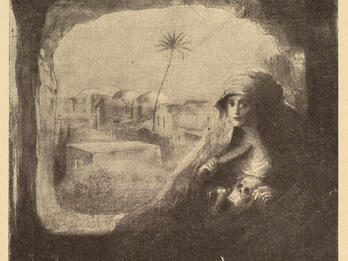Manifesto
Many skeptics have denied the existence of Jewish music. Some lump it together with Oriental music; others refuse to admit its independence a priori, by virtue of the nomadic fate of the Jews, who have been subjected to cross-influences from various cultures and ethnic groups. These views reveal more decisiveness than they do familiarity with the question at hand. The dominance of the minor key in Jewish music does bring it closer to Oriental music; however, similarity is not identity. In Jewish music, the minor merely dominates but is not sovereign, as it is in Oriental. In the harmonic respect, it differs both from Oriental music and from modern music, as well as from ancient music. With respect to foreign influences, all peoples in contact with other peoples are subject to influences from without. The point is not borrowings, though, but how those borrowings are refined in the crucible of the national consciousness. It is important that this transformation be organic rather than mechanical. If the appropriation comes about organically, then an abundance of influences is not a shortcoming; rather, it contributes to a multifaceted, internally rich character. It would be more than superficial to assert that everything in Jewish music comes down to the simple expropriation of foreign riches. It is sufficient simply to listen to it somewhat closely and thoughtfully to perceive its uniqueness, originality, and distinctiveness. Its particularity is manifested not only in its melodic turns, harmonic structure, and rhythmic accents but especially in its tragic element, its lyricism, and its humor, in its declamatory, recitative style, and in the condensed nature of its pathos. Of course, in those historical periods when assimilation wiped away the Jews’ national individuality, their national art lost its individuality as well. However, those were merely temporary, transitional phenomena. Serving as proof of this is the mere fact of the Society’s emergence and its vibrant activities, which testify to a rise in national self-awareness. In any case, the fact that Jewish composers have turned to the art of their people as a source of inspiration and have resolved to clothe the naïve and artless folksong in the highest cultural forms of modern music must necessarily have a tangible effect. Among all peoples, the process of folk-art permeating artists has led to the creation of national schools of art.
The serious national cause that the Society is bringing to life should interest everyone to whom the fate of Jewry is dear. What is more, provincial Jews who are in intimate touch with the Jewish masses and in close contact with the folk element should feel especially deeply the vital charm of Jewish folk music and understand the power and truth of its expression and the richness of its forms.
The Society is certain that in carrying out its difficult but urgent task it will meet with the proper sympathy and support from the provinces.
Credits
Published in: The Posen Library of Jewish Culture and Civilization, vol. 7.




